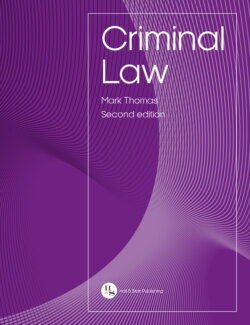Читать книгу Criminal Law - Mark Thomas - Страница 64
На сайте Литреса книга снята с продажи.
2.3.2Result crimes
ОглавлениеResult crimes are offences where the defendant’s conduct has caused or resulted in certain specified consequences. Examples of result crimes include:
•murder;
•grievous bodily harm (GBH); and
•common assault.
In these cases, there must be proof that the defendant ‘caused’ the end result. For example, the offence of murder requires an ‘unlawful killing of a human being’. In the case of murder, many students incorrectly state that causation is satisfied where the victim ‘dies’. As will be discussed in Chapter 8, this is inappropriate, given that everyone must die at some point in their lives. As a result, therefore, the true causation element required for murder is that death has been ‘accelerated’ as a result of the defendant’s conduct (R v Dyson [1908] 2 KB 454, per Lord Alverstone CJ).
For example, should Jill stab Jack to death, the stabbing is the conduct. The acceleration of the death of Jack is the result or consequence of that conduct. It must be proven, therefore, that Jill caused the death of Jack. In this example, it may appear obvious that Jill has caused Jack’s death. However, consider these alternative facts:
• Jill had only stabbed Jack in the arm. As a result, Jack fell backwards, hit his head on a rock and died. Would Jill still be the cause of death?
•Jack, on being taken to the hospital, was involved in a car crash and died. Would Jill still be the cause of death?
Causation can be a difficult topic for students to grasp and will be considered below at 2.7.
